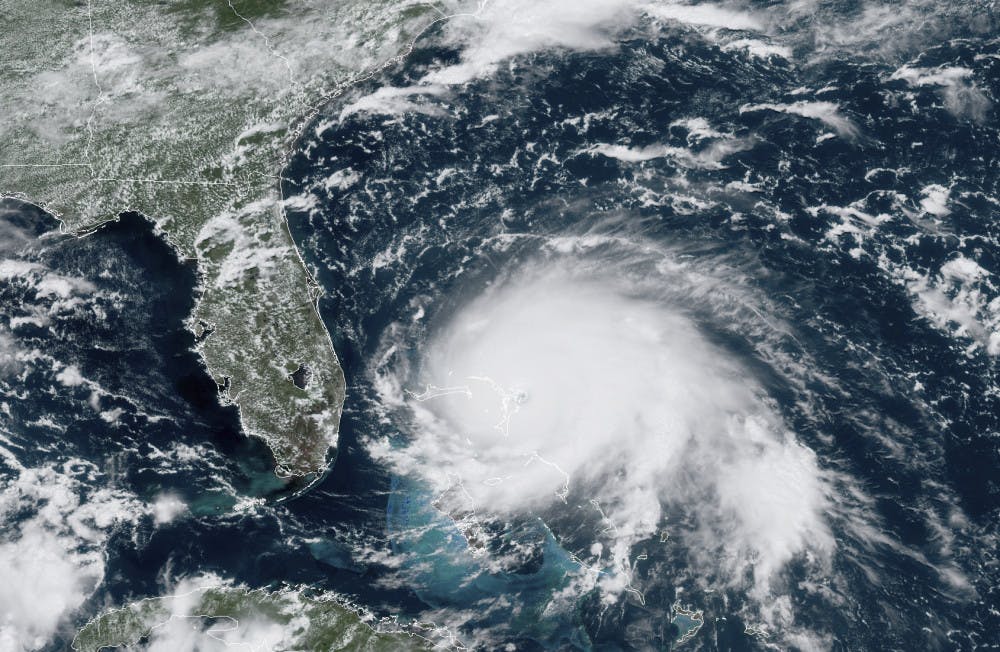Last week, Hurricane Dorian rolled into the Caribbean as a monster hurricane. Although Florida was mostly spared from the storm’s destruction, the island nation of the Bahamas was not. The country’s prime minister called Dorian’s impact“generational devastation.” Looking at the damage, you can see why: 60 percent of the homes on the Bahamian island of Abaco were destroyed; entire neighborhoods were flattened; 70,000 people were left homeless; and the current death toll of 43 is expected to rise drastically. It’s fair to say the hurricane devastated the Bahamas. The worst part is that Hurricane Dorian is not an anomaly.
Many people are already aware of the serious dangers posed by climate change. Rising sea levels flooding coastal areas, environmental degradation and habitat loss are just a few examples. For years, researchers have also been investigating a possible link between climate change and Atlantic hurricanes. The results so far aren’t promising. As a report from NOAA’s Geophysical Fluid Dynamics Laboratory concluded, “It is likely that greenhouse warming will cause hurricanes in the coming century to be more intense globally and have higher rainfall rates than present-day hurricanes.”
Intensity isn’t the only thing about hurricanes that climate change could explain. An article from the non-profit InsideClimate News looked at why hurricanes like Harvey, Florence and Dorian stalled in place. While there is still much debate over the specifics, the general consensus is that factors like the warming of the Arctic are causing a slowdown in global winds in the tropics and mid-latitudes, thus making it harder for these storms to move. As we just saw with Dorian, these stalled storms can dump massive amounts of rainfall over a few days and cause serious flooding and other damage. While this evidence is concerning, I should point out that while there is agreement that global warming and climate change is leading to more intense hurricanes, we cannot definitively link any single storm to climate change. Rather, storms like Dorian fit a pattern of stronger hurricanes that is supported by significant amounts of research.
The evidence we have shows the relationship between climate change and hurricanes is, if not fully understood, at least compelling enough to warrant immediate and decisive action. Unfortunately, one place we can’t count on for decisive action on climate change at the moment is our federal government. The current president has denied human-caused climate change in the past, he withdrew from the Paris Agreement on climate change and the party he is part of, which still controls the Senate, has a long history of denying humanity’s role in causing climate change. President Trump and other Republican officials may continue to bury their heads in the sand about climate change, but between more intense storms, global temperatures continuing to rise and entire island nations at risk of being submerged by rising sea levels, it’s becoming increasingly harder to ignore the dire risks posed by climate change.
With the deniers paralyzing federal action on climate change, it’s time for others to step up to the plate. The more than 400 U.S. mayors who pledged to continue to uphold the Paris Agreement after Trump’s withdrawal are leading the way, but county governments, state governments, and private groups also have a role to play. Perhaps the most important thing you can do as an individual is vote. Vote for candidates who share your priorities on climate change, and if you have the time and energy, volunteer for those candidates’ campaigns to convince others to vote for them as well. The federal government may not be able to move forward on climate change, but that doesn’t mean all of us should be inactive.
Jason Zappulla is a UF history senior.
This GOES-16 satellite image taken Sunday, Sept. 1, 2019, at 17:00 UTC and provided by National Oceanic and Atmospheric Administration (NOAA), shows Hurricane Dorian, right, churning over the Atlantic Ocean. Hurricane Dorian struck the northern Bahamas on Sunday as a catastrophic Category 5 storm, its 185 mph winds ripping off roofs and tearing down power lines as hundreds hunkered in schools, churches and other shelters. (NOAA via AP)






